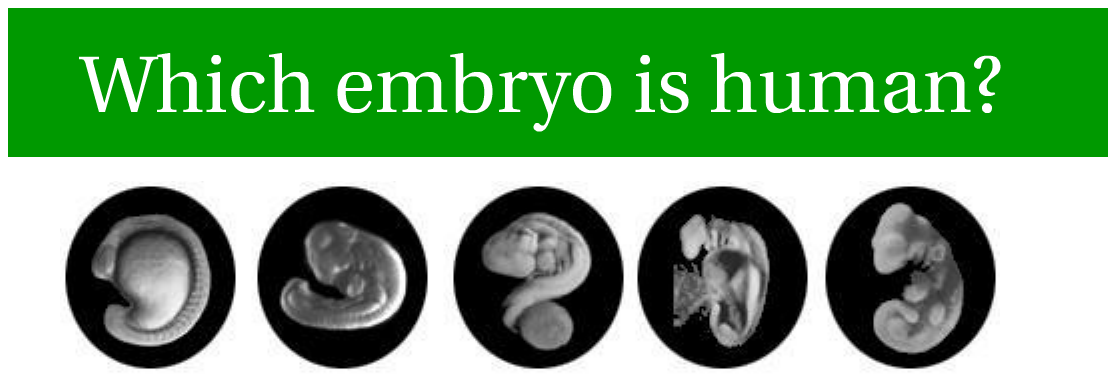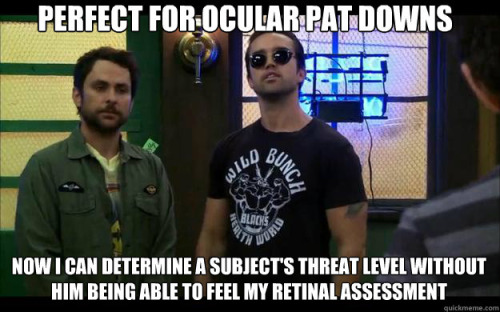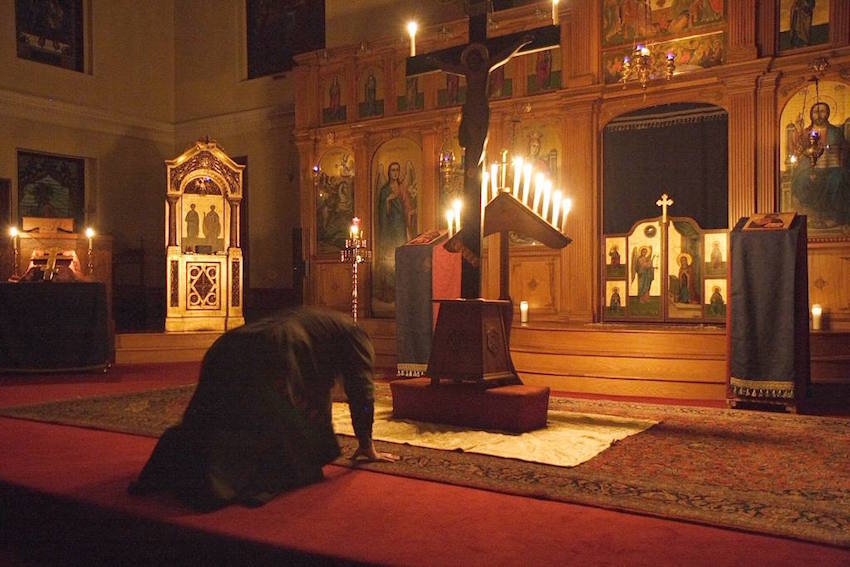Audrey Assad Interview
Audrey Assad is, by far, my favourite contemporary Catholic artist. Here’s an interview she recently gave to “Our Catholic Way”:
"We are travellers…not yet in our native land" – St. Augustine
Audrey Assad is, by far, my favourite contemporary Catholic artist. Here’s an interview she recently gave to “Our Catholic Way”:
Last January I had a discussion on Facebook in which the person with whom I was speaking made the bold claim that the unborn “aren’t human yet”. An interesting assertion! I responded with two questions:
Question #1: “What kind of offspring do human parents have?”
Question #2: “What do you call an organism with human DNA?”
Of course, the answer to both of these questions is “human”. Unfortunately, my friend chose to ignore both of these questions, so I asked another:
“If a fetus in his mother’s womb isn’t human…what is he? To what species does he then belong?”
Once again, this question went answered. To assert that the unborn aren’t human requires that they be something else. I asked repeatedly what that “something else” was, but I never got an answer…
Eventually, my friend posted the following image:

From left-to-right, this picture shows embryos from different species: zebrafish, chicken, dog, human and skink. Although he didn’t articulate it, it appeared that he thought that being unable to visually identify the human fetus somehow proved that the it wasn’t human.
This is, of course, terrible logic. If I don’t know the answer to a question on a quiz show, does that mean that no answer exists? Of course not, it just means that I don’t have the right information at my fingertips.
 There are lots of things which aren’t easy to identify with the naked eye. An unmarked bottle of sulfuric acid (H2SO4) can look very similar to a bottle of water (H20). If I placed an unmarked bottle of each liquid in front of you, would a visual inspection be enough to convince you to take a drink from one of them? Of course not! What would need to happen in order to make you drink with confidence? You’d want to run more conclusive tests than a simple visual inspection.
There are lots of things which aren’t easy to identify with the naked eye. An unmarked bottle of sulfuric acid (H2SO4) can look very similar to a bottle of water (H20). If I placed an unmarked bottle of each liquid in front of you, would a visual inspection be enough to convince you to take a drink from one of them? Of course not! What would need to happen in order to make you drink with confidence? You’d want to run more conclusive tests than a simple visual inspection.
In the same way, just because I can’t easily see from an image whether or not a fetus is a human fetus, doesn’t change the fetus’ species. It’s true that the naked eye can’t easily give you the answer to that question, but appropriate scientific examination can! In this case, a simple DNA test could give you a conclusive answer as to the species of each of the above embryos.
Biologically speaking, it is impossible to declare that the unborn are anything less than human. If they are indeed human, it would follow that, as such, even the unborn should be treated with respect and dignity.
“Blessed are the pure in heart for they shall see God.” – Matthew 5:8
“Every Christian feels a natural yearning of the heart towards God, a true desire to taste the sweetness of communion, of being with Him as He created us to be: but the impurity of our hearts – full of passions conflicts, and fear bars the way. Yet, there is a cure for the weight of sin which burdens the heart and soul of each of us and afflicts the conscience, keeping us from inner peace and from peace with our neighbors and loved ones.”
In the Holy season of Great Lent we contemplate the mystery of repentance. But what does it mean to be repentant? In the overly intellectual modern age we tend to focus on how we have violated moral laws either through action or inaction. Repentance is much more than a passing feeling of sorrow for wrongs done which, upon reflection can easily overwhelm us and lead to despair. It is a turning away from focusing on worldly matters to those of God. It is a new outlook, a new, correct spiritual direction which we should strive to live at all times, not just during this special season.
According to Saint Gregory Palamas, “Repentance, is to hate sin and love virtue, to reject evil and to do good.” But how do we reach this state? Why should we even strive for repentance? Should we as some modern people say, let go of the guilt and just do good? It may be helpful to reflect on our fallen state as humans to light the way.

 You hear a lot about “Partial Birth Abortion” in the news, but what exactly is involved in the procedure? In the video below, a doctor uses a doll to explain what exactly takes place…
You hear a lot about “Partial Birth Abortion” in the news, but what exactly is involved in the procedure? In the video below, a doctor uses a doll to explain what exactly takes place…
 A while back Buzzfeed released a really annoying video I’m Christian but I’m not… I watched the video and couldn’t help but ponder on some words absent from the content: sin, grace, repentance, redemption and, most worrying…Jesus.
A while back Buzzfeed released a really annoying video I’m Christian but I’m not… I watched the video and couldn’t help but ponder on some words absent from the content: sin, grace, repentance, redemption and, most worrying…Jesus.
A friend recently sent me a parody by Lutheran Satire of the video. I don’t think it’s Lutheran Satire’s best work and a few parts aren’t great, it still gets the point across…
I also came across this really great “Catholics Respond to…” video on the same subject:
Here’s a homily recorded in the Synaxarion for February 9th, entitled “Whoever keeps My word will never taste death” (St. John 8:52)…
As long as a candle burns in a room, there will not be darkness as long as the candle burns and emits light. If food is seasoned with salt, it will be preserved from spoiling. If someone keeps the word of Christ in his soul, that one keeps salt and light in his soul and life will abide in him. Such a soul will not become dark in this life neither will it taste decaying death.
Whoever keeps the word of Christ in himself, the word of Christ sustains him from within and feeds him and enlightens him and enlivens him. Whether he is in the body or outside the body, he feels equally alive from the word of Christ, i.e., from the undying eternal life. The death of the body will give to his Life-bearing soul only a freer enthusiasm in embracing Christ, the Beloved Life-giver.
But, what does it mean, brethren, to keep the word of Christ within ourselves? That means; First: to keep the word of Christ in our mind, thinking about it; Second: to keep the word of Christ in our heart, loving it; Third: to keep the word of Christ in our will, fulfilling it in deeds; Fourth: to keep the word of Christ on our tongue, openly confessing it when it is necessary to do so. Thus, to keep the word of Christ means to fill ourselves with it and to fulfill it. Whoever would keep the word of Christ in this manner, truly, he will never taste of death.
O our Lord, Mighty Lord, mightier than death, give us strength and understanding to keep Your holy word to the end; that we do not taste of death and that death does not taste of us; that decay does not touch our soul. O Lord Allmerciful be merciful to us

Following on from yesterday’s post, recent discussions on Facebook have reminded me of how the abortion debate often turns around the question of language.
A few months ago I had posted an article about abortion and one of my friends wrote this response:
“You’re going to have a hard time convincing someone zygote development at 4 weeks is a fetus… When we talk in terms of a 6 week fetus it’s probably closer to bundles of cells than it is to a fetus…”
My friend’s response shows why it’s important to have a good grasp of biology when speaking about the unborn. What do we mean when we use words like “zygote”, “embryo” and “fetus”?

“Zygote”, “embryo” and “fetus” are all simply labels which describe the developmental stage of the human child, much like “infant”, “toddler” or “teenager”. A zygote is a diploid cell which is the result of fertilization of an egg by a sperm. After about twenty-four hours, cell division begins and we move from the zygote phase of development to the embryonic. After eight weeks, we move from the embryonic to the fetal.
Hopefully it’s now clear as to why I’d never try to convince someone that “zygote development at 4 weeks is a fetus”…because it’s not! It would be as nonsensical as talking about an eight-year-old toddler or a twenty-year-old teenager.
Developmental Cheat Sheet
Zygote: Human development within the first 24 hours
Embryo: After 24 hours of life, when cell division has begun. It remains in this stage for the first eight weeks.
Fetus: A development stage following eight weeks of life up until birth.
Infant: Up to twelve months after birth
Toddler: 1-3 years after birth
Adolescent: The time after birth when conversation is exchanged for incoherent grunts and parents are treated as a cross between an ATM and a taxi service.
Regardless of the name we use to describe someone’s age, all humans deserve to be protected.